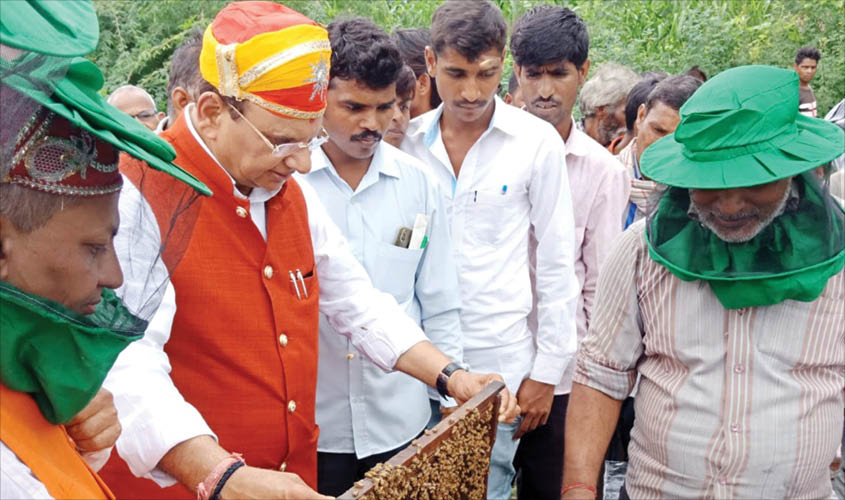Its efforts to improve the state of beekeeping have helped increase the volume of honey exports from 29.6 to 51.5 thousand tonnes between 2014-15 and 2017-18.
It’s literally a case of a “sweet” success story for the Khadi and Village Industries Commission (KVIC). “Sweet” because KVIC may have khadi attached to its name, but it’s the production of honey that is giving the top khadi organisation a financial wing.
KVIC Chairperson Vinai Kumar Saxena said: “As per the Food and Agriculture Organisation database, in 2017-18, India ranked eighth in the world in the production of honey, with 64.9 thousand tonnes, while China stood first with a production level of 551 thousand tonnes. We are committed to bringing India to the third position within a year.”
The KVIC’s efforts to improve the state of beekeeping in India have helped increase the volume of honey exports from 29.6 to 51.5 thousand tonnes between 2014-15 and 2017-18, as per data from National Bee Board and the Ministry of Agriculture and Farmers’ Welfare.
It’s this giant leap in the export of honey, along with the impressive production of papad and cosmetics, that has made KVIC register an impressive 25% jump in sales to a little under Rs 75,000 crore during 2018-19. A senior KVIC official said: “Such has been the impressive gain in the production of honey—along with papad and cosmetics—that khadi products contributed just above 4% of the total sales during the last financial year.”
However, beekeeping isn’t just about honey production. Saxena said: “Beekeeping and honey production will play a big role in doubling the income of farmers in India by 2022. Our studies suggest that farm productivity increases by 30% if bee boxes are placed there. Bee collects pollen nectar from about 3-km radius. So, when you place bee boxes in an area, you are not only making honey for yourself, but also benefiting the farmers in that entire radius.”
The KVIC chairperson reminded of the Modi government’s sincerity from the fact that the PM’s Economic Advisory Council has set up a Beekeeping Development Committee under Professor Bibek Debroy, which in its 26 June 2019 report explores ways to provide much-needed impetus to farm productivity and job creation.
“Based on the area under cultivation in India and bee forage crops, India has a potential of about 200 million bee colonies as against 3.4 million bee colonies today. Increasing the number of bee colonies will not only increase the production of bee-related products, but will boost overall agricultural and horticultural productivity,” the report states.
“KVIC has distributed 1.15 lakh bee-boxes among farmers and unemployed youths across the country under its ‘Honey Mission’ initiative. This has happened for the first time in India,” said Saxena and emphasised that the top khadi organisation has created more than 20 lakh new jobs in the last five fiscals under the Prime Minister Employment Generation Programme.
“Honey Mission” was launched in August 2017 in line with PM Modi’s call for “Sweet Revolution” in 2016.
“KVIC is active across the country from the terrains of Kashmir and Ladakh to the riverine areas of the Sundarbans. We not just give bee houses and other equipment to the youth and the needy, but also provides them training on how to run the bee business and become a successful entrepreneur. In Kashmir, for instance, we are working closely with the Army in bringing the locals in the mainstream. We have so far distributed 2,300 bee boxes in Kupwara district alone. By creating jobs, one can contain militancy.”
Such has been the “sweetness” of the KVIC’s success story that its sales are almost twice that of Hindustan Unilever’s, the country’s largest consumer goods company.

